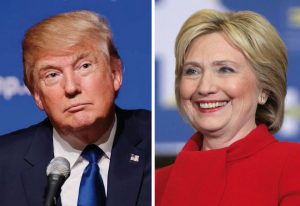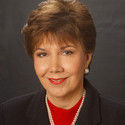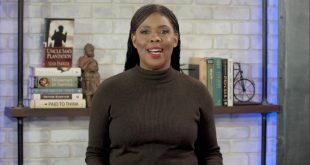 The stakes couldn’t be higher for both presidential candidates Sunday when they meet for their second debate. Hillary Clinton is up in national polls and in most battleground states after Donald Trump’s disastrous meltdown in their first debate, but voters are still less than enthusiastic about her. However, the bigger challenge is Trump’s: He has to come across as knowledgeable, temperate and empathetic, qualities he has yet to demonstrate in more than a year of campaigning. And the town hall format is likely to highlight weaknesses for both candidates.
The stakes couldn’t be higher for both presidential candidates Sunday when they meet for their second debate. Hillary Clinton is up in national polls and in most battleground states after Donald Trump’s disastrous meltdown in their first debate, but voters are still less than enthusiastic about her. However, the bigger challenge is Trump’s: He has to come across as knowledgeable, temperate and empathetic, qualities he has yet to demonstrate in more than a year of campaigning. And the town hall format is likely to highlight weaknesses for both candidates.
Trump feeds off big, adoring crowds, but put him in a room half-filled with skeptics and he’s likely to get testy. Trump’s style is never to try to woo people who might disagree with him. He’s always preaching to the choir. If you already think China and Mexico are stealing your job and ripping you off, Trump will magnify your anger and resentment with his booming voice. If Mexicans and Muslims make you nervous, Trump will promise to deport many of the former and make sure fewer of both groups gain entry. But if you’re looking for real policy solutions to big problems, Trump can only mouth bombastic sound bites. He’d build a wall and make Mexico pay for it. He’d slap a 45 percent tax on Chinese goods. He’d engage in “extreme vetting” of foreign visitors. Don’t ask him how he would accomplish any of this; he hasn’t gotten past the applause lines.
Clinton’s problem is the flip side of Trump’s. She can give you a 10-point analysis of any issue and come up with a detailed solution, which usually involves more government spending paid by higher taxes on the rich. But Clinton also has a big problem appealing to one voting bloc she needs to do better among if she is to win — namely, whites. Clinton trails Trump among whites, by an average of 13 points in an analysis by FiveThirtyEight, though she does much better among those whites with a college degree. Trump spends a lot of time insulting nonwhites, whose votes he most likely would not win even if he adopted a different tune. But his electoral strategy doesn’t depend on winning Latino, black or Asian votes. Clinton, on the other hand, can’t seem to resist painting whites as bigots, even if they don’t know it. In the first debate, she answered a question about police shootings of black men by saying, “I think implicit bias is a problem for everyone, not just police.” Lines like that rankle many of the very voters she needs.
Beyond the substance of the debate, the setting isn’t likely to flatter either candidate, but it may be especially challenging for Clinton. Each candidate will sit on a tall stool while the other is speaking, but how do you pick a stool height that suits both a 6-foot-3-inch man and a 5-foot-5-inch woman? And if Trump invades Clinton’s space, as Al Gore infamously did in the 2000 town hall debate, he’ll look like a bully. If Clinton stumbles, she’ll feed into conspiracy theories about her health.
But the biggest challenge for both candidates will be the audience. Will Trump face questions from an immigrant who came to the U.S. illegally as a child but has done everything right while here, graduating from high school and maybe even college — someone who might face deportation if Trump were to be elected? Will Clinton face a voter who can’t square the fact that a U.S. ambassador and three others died at the hands of terrorists in Benghazi, Libya, with Clinton’s early assertions that an anti-Islam video sparked the violence? Will members of the audience dare to demand Trump’s tax records or tell Clinton they don’t fully trust her? And how will the audience react if Trump makes good on his promise to bring up Bill Clinton’s infidelities in this debate?
Debates rarely win or lose elections. But in this volatile year, when most voters share at least some unease about the candidates they must choose from, a bad debate performance might just tip the balance. If Clinton stumbles, literally or figuratively, she’ll lose some of her recent momentum. And if Trump does as poorly in this format as he did in the first, don’t bet he’ll even show up for the third debate.
COPYRIGHT 2016 CREATORS.COM
Photo credits: Gage Skidmore, Wikimedia Commons
 Linda Chavez is Chairman of the Center for Equal Opportunity. She also writes a weekly syndicated column that appears in newspapers across the country and is a political analyst for FOX News Channel.
Linda Chavez is Chairman of the Center for Equal Opportunity. She also writes a weekly syndicated column that appears in newspapers across the country and is a political analyst for FOX News Channel.
The views expressed in opinion articles are solely those of the author and are not necessarily either shared or endorsed by Black Community News.
 CURE News and Clergy Blog News and Commentary for Christians
CURE News and Clergy Blog News and Commentary for Christians




Wanting the best for my grandchildren, having prayed and done my homework, I MUST VOTE for Trump.